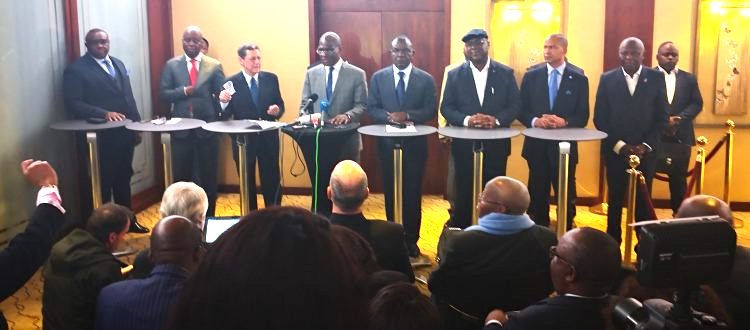By Lisa Vives, Global Information Network
NEW YORK | KINSHASA (IDN) – As election day nears in the troubled Democratic Republic of the Congo, the seven leaders of the opposition seemed settled on one person to challenge the handpicked candidate of President Joseph Kabila – but differences unexpectedly arose.
The agreement to back Congolese lawmaker Martin Fayulu Madidi, facilitated by the Kofi Annan Foundation after three days of negotiations in Geneva, fell apart, with a major opposition leader going his own way. Felix Tshisekedi, head of the largest opposition party, said he was abandoning a day-old agreement to field a joint candidate in the December crucial presidential polls.
He spoke shortly after the secretary general of his party, the Union for Democracy and Social Progress (UDPS), gave him 48 hours to dial back from the decision or face protests by activists.
“I gather that the agreement reached in Geneva was not accepted by the grassroots and was rejected by them,” Tshisekedi said in an interview with radio station Top Congo. A smaller opposition party, led by Vital Kamerhe, followed suit.
UDPS activist Simon Kashama said that if Tshisekedi refused to withdraw his signature from the Geneva deal, “he will be stripped of office — it’s the party base which decides”.
“We haven’t been fighting for 36 years to have a joint candidate but to have a change of government, to win power,” he said.
As news spread in the capital, Kinshasa, demonstrators gathered in the pouring rain to express their frustration outside Tshisekedi party headquarters.
Pierrot Mwanamputu, police spokesperson, told the AFP news agency that the crowd burned effigies and pictures of Tshisekedi, while witnesses reported seeing them burning tires.
Fayulu, a popular businessman and a veteran parliamentarian, was tipped to beat Emmanuel Ramazani Shadary, a little known minister within the Kabila government described as “a hard core loyalist” and the ruling party’s choice for successor.
A 61-year-old former oil executive educated in the U.S. and France, Fayulu gained prominence for his role in marches opposing Kabila after he remained in power beyond his constitutional term.
The break-up means the poll, scheduled for December 23, could be a disaster with opposition votes divided among seven candidates and Shadary, backed by 17 groups supporting the party of Kabila, will get their larger total vote.
Although President Kabila has announced his intention not to participate as a candidate, there are questions about whether a fair, credible, free, and peaceful presidential election will be held or will this simply be a ploy to allow Kabila to remain in control of the government, John Mukum Mbaku, writing for the Brookings Institution, wondered.
“Many Congolese are afraid that Kabila will use some excuse, such as the lack of resources and the absence of an official electoral register, to again postpone the elections. Alternatively, some observers believe that the choice of a die-hard loyalist, such as Ramazani, could be an indication that Kabila simply wants to have someone who will keep the presidency for him as he will be eligible to return in 2023.
“In addition to the fact that Kabila will retain his position as leader of the People’s Party for Reconstruction and Democracy, he has also packed the federal bureaucracy, including the courts and the military, with his loyalists.
“Since the assassination of the country’s first prime minister, Patrice Lumumba, in 1961, there has been widespread dissatisfaction among the DRC masses,” writes Mbaku. “The next government has the opportunity to radically transform the DRC from a country trapped in political violence, underdevelopment, and extreme poverty to one with plenty of opportunities for self-actualization and a government that is trusted by its citizens.”
The Congo has significant natural resources but has never known a peaceful transition of power since it gained independence from Belgium in 1960. Some experts fear the December elections will trigger a bloody conflict.
Meanwhile, an outbreak of Ebola has taken over 200 lives. The UN’s Department of Peacekeeping has called on armed groups active in the region not to hinder efforts to fight the disease. [IDN-InDepthNews – 13 November 2018]
Photo: The Kofi Annan Foundation facilitated the process of consultation and dialogue between the opposition political parties of the Democratic Republic of Congo from 9 to 11 November 2018 in Geneva. Source: Kofi Annan Foundation
IDN is flagship agency of the International Press Syndicate.
facebook.com/IDN.GoingDeeper – twitter.com/InDepthNews

